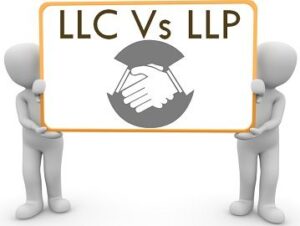ô 
Introduction
When it comes to structuring a business, choosing the right entity is crucial. Two common business structures often compared are Limited Liability Partnerships (LLP) and Limited Liability Companies (LLC). Though they share similarities, they serve different purposes and are suitable for different types of businesses. This article will explore their differences, benefits, applications, limitations, and other key considerations.
Definition
LLP (Limited Liability Partnership)
An LLP is a partnership structure where each partner has limited liability, meaning they are not personally responsible for the debts or actions of other partners. This structure is ideal for professional service firms such as law firms, accounting firms, and consulting agencies.
LLC (Limited Liability Company)
An LLC is a hybrid business entity that combines the liability protection of a corporation with the tax benefits and operational flexibility of a partnership. LLCs are suitable for small businesses, startups, and even single-member businesses.
Applications
- LLP: Commonly used by professional service providers like lawyers, doctors, accountants, and architects who want liability protection while retaining operational flexibility.
- LLC: Suitable for a broad range of businesses, including retail, real estate, technology startups, and e-commerce, offering owners flexibility in taxation and management.
Benefits
LLP Benefits:
- Limited liability protection for partners
- Flexible management structure
- Tax advantages similar to a general partnership
- Easy to form and operate
LLC Benefits:
- Liability protection for owners (members)
- Can have multiple ownership structures
- Pass-through taxation or corporate taxation option
- Fewer formalities compared to corporations
Limitations
LLP Limitations:
- Typically requires at least two partners
- Less flexibility in ownership and profit distribution
- Some states impose higher compliance requirements
LLC Limitations:
- Higher administrative costs compared to sole proprietorships
- Some states charge higher fees for formation and maintenance
- Limited lifespan in some jurisdictions unless renewed
Cooperative Table Comparison
| Feature | LLP (Limited Liability Partnership) | LLC (Limited Liability Company) |
|---|---|---|
| Liability | Limited to partnersã investments | Limited to membersã investments |
| Taxation | Pass-through taxation | Choice of pass-through or corporate taxation |
| Ownership | Requires at least two partners | Can have one or multiple members |
| Management | Managed by partners | Managed by members or managers |
| Industry Focus | Professional services | Any business type |
| Formation Costs | Lower in some states | May have higher fees in some states |
| Continuity | Can dissolve if a partner leaves | Can be perpetual if structured properly |
Conclusion
While LLPs and LLCs share some similarities, they serve different business needs. LLPs are typically used by professionals seeking partnership advantages with limited liability, while LLCs provide more flexibility in ownership and taxation. The best choice depends on your industry, business goals, and legal requirements.
FAQs
- Which is better: LLP or LLC?
- It depends on your business needs. LLPs are best for professional firms, while LLCs offer more flexibility for different business types.
- Do LLPs and LLCs both offer limited liability?
- Yes, both structures provide liability protection but in different ways.
- Can an LLC have unlimited members?
- Yes, an LLC can have multiple members or even be a single-member entity.
- Are LLPs taxed the same way as LLCs?
- LLPs typically have pass-through taxation, while LLCs can choose between pass-through or corporate taxation.
- Can an LLP be converted into an LLC?
- Yes, but the process varies by state and may involve legal documentation and restructuring.
- Which is easier to form: LLP or LLC?
- Generally, both have simple formation processes, but LLCs might require more paperwork depending on state laws.
- Do LLPs and LLCs require annual filings?
- Yes, both entities typically have annual reporting requirements, though they vary by state.
- Are there industries where LLPs are preferred over LLCs?
- Yes, professional service firms like law and accounting prefer LLPs due to regulatory benefits.
- Can an LLP have investors?
- LLPs do not typically allow outside investors; LLCs offer more investment flexibility.
- Do all states recognize LLPs and LLCs?
- Most states recognize both structures, but requirements and regulations differ.
By understanding the differences, applications, and legal implications of LLPs and LLCs, business owners can make informed decisions on the best structure for their needs.
For further details access our website: https://vibrantfinserv.com/

For more information visit this site: https://www.mca.gov.in
To visit: https://www.mca.gov.in/
Contact:ô ô ô ô 8130555124, 8130045124
Whatsapp:ô ô https://wa.me/918130555124
Mail ID:ô ô ô ô ô ô operations@vibrantfinserv.com
Web Link:ô ô ô https://vibrantfinserv.com
FB Link:ô ô ô ô ô ô https://fb.me/vibrantfinserv
Insta Link:ô ô https://www.instagram.com/vibrantfinserv2/
